2024 | September Newswrap: Updates from Member Organizations Worldwide
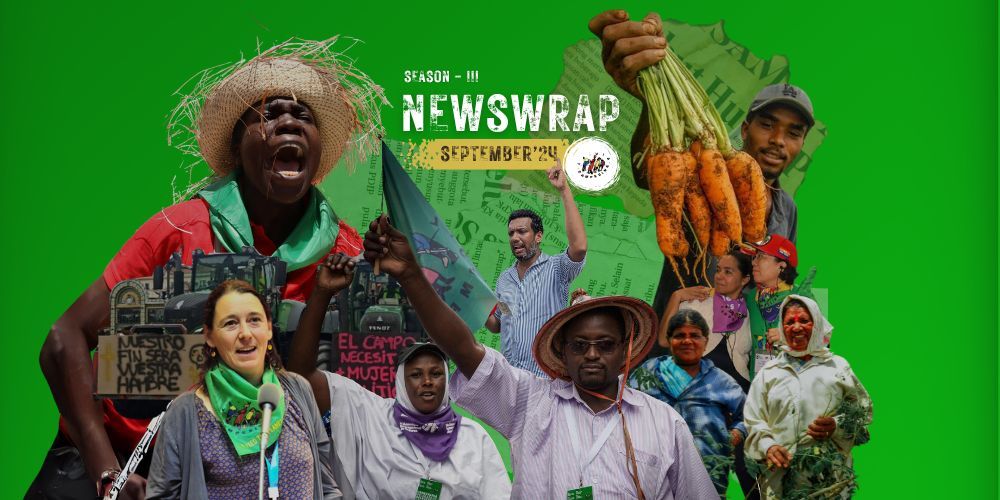
September witnessed a surge of struggles, actions, and protests organised by La Via Campesina members around the world, addressing the pressing issues of trade justice, climate crisis, threats to food sovereignty, and peasant rights. A highlight of these actions was the International Day of Action Against the WTO and Free Trade Agreements on 10 September 2024, alongside participation in the 57th session of the Human Rights Council, where our delegates pushed for the implementation of the United Nations Declaration on the Rights of Peasants and Other People Working in Rural Areas (UNDROP). The launch of continental schools for peasant women in Asia and Africa this month also marks a significant step forward in popularising peasant feminist ideas and in our global efforts to challenge patriarchy within our societies.
Let’s dive into the details;
Africa’s first Continental School of Women was held in Togo from 9 to 14 September, bringing together peasant women from all La Via Campesina member organisations in Africa. The training sessions focused on understanding the struggles faced by women peasants and small-scale farmers, empowering participants to advocate for just transformations in rural communities. Discussions addressed how patriarchy and capitalism create inequalities and deny women basic human rights. The school also aimed to empower women to speak out against violence and highlighted agroecology for food sovereignty.
In Southern Africa, in Zimbabwe, ZIMSOFF organised its annual food and seed festivals across four clusters (Central, Western, Eastern, and Northern) to showcase and protect peasant seeds and traditional foods. One event, held in Nemamwa Growth, Masvingo, under the theme “Celebrating the Diversity and Resilience of Zimbabwean Foods,” brought together over 40 farmers to promote agroecology, seed and food sovereignty, share knowledge, and exchange seeds. This event also served as preparation for the national food and seed gathering at the Harare Botanical Gardens, which took place in mid-September.
In Uganda, ESAFF Uganda organised the 6th Annual National Organic Week 2024 under the theme of promoting organic farming as a pathway to sustainable food production and climate resilience. The event popularised best agroecological practices among small-scale farmers, schools, and local leaders, educate consumers on the importance of consuming organic products, and promote organic certification using the Participatory Guarantee System (PGS). It also emphasised the role of organic farming in environmental conservation and climate change mitigation.
In Senegal, the Conseil National de Concertation et de Coopération des Ruraux (CNCR) mobilised women and youth to plant over 35 hectares of mangrove swamp. This reforestation effort, conducted in late August 2024, involved several communes in Oussouye and Bignona in the Ziguinchor region. The initiative aims to support rural women and youth in adapting to climate change while strengthening their resilience.

Over to Asia, members of La Via Campesina organised the Continental School of Asian Women’s Articulation from 19 to 26 September. Nearly 60 women from peasant organisations and small food producers across 13 countries participated, hosted by the Assembly of the Poor in Bangkok, Thailand. Participants shared testimonies of land dispossession, rising rural debt, the growing influence of private microfinance companies, and corporate capture of indigenous seed systems. The school also featured study sessions on the proliferation of free trade agreements and their impact on rural food production, food sovereignty, and public services. One session focused on the UN Declaration on the Rights of Peasants, exploring its potential to shape public policies regarding women’s access to land, seeds, and commons.
In South Asia, in Sri Lanka, MONLAR conducted a training session on the UN Declaration on the Rights of Peasants and Other People Working in Rural Areas in the Eastern Province. This region is one of the most ethnically complex in the country, and land rights have been a critical factor in the ethnic conflict that lasted over two decades. To this day, there are regular reports of land disputes between local communities, the state, its defence forces, and private companies. The aim of the training workshop was to explain to communities the various rights guaranteed by this non-binding UN declaration, to which Sri Lanka is a signatory.
In India, farmers’ unions in the state of Madhya Pradesh are agitating for an increase in support prices for soybean, wheat, and paddy. The Bhartiya Kisan Union joined the protesting farmers and staged a tractor parade in Seoni Malwa, demanding at least a 23% increase over the existing support price for soybean. It is important to note that the longstanding demand of Indian farmers for price support as a legal guarantee has not yet been realised, and many farmers report being forced to sell in private markets at prices far below the official support price out of desperation.
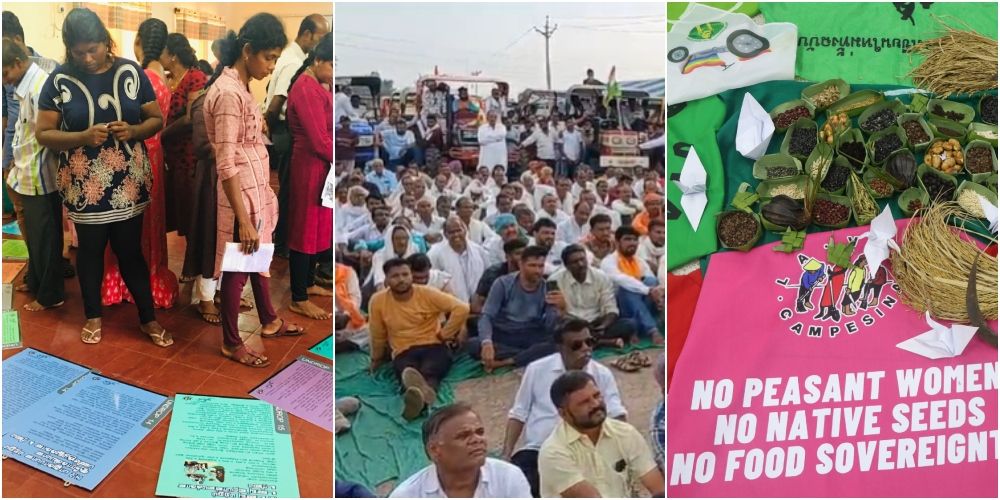
In South East and East Asia, in Japan, The Family Farmers’ Movement (Nouminren) and its allies issued a call on 10 September to protest the government’s mismanagement that has created a serious situation for rice producers, who are forced to endure low rice prices and reduce production, while citizens struggle to buy rice and retailers cannot sell it. In recent months, Japan has faced a rice shortage. Online sellers and grocery stores have struggled to meet demand for this essential staple, while uncertainties regarding weather, earthquake forecasts, and extreme heat have also led to production bottlenecks and supply disruptions for farmers and consumers. Historically, rice shortages have led to political instability and even riots, as seen in 1918 and more recently in 1993.
In Indonesia, the Serikat Petani Indonesia commemorated National Peasants Day on 24 September by organising a massive rally outside the Presidential Palace and Parliament Building. Protesters emphasised the urgent need to accelerate agrarian reform to promote food sovereignty. SPI Chairperson Henry Saragih called for land redistribution to ensure justice for farmers, noting that the nation’s rice fields have significantly declined from 8 to 9 million hectares to around 7 million hectares, with a rise in the number of subsistence farmers owning less than 0.5 hectares over the past decade.
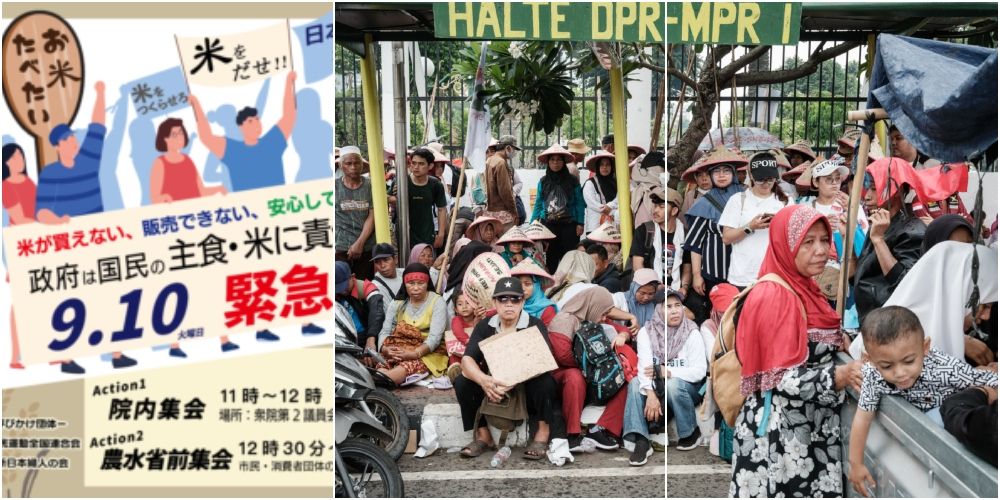
In news coming in from Europe, the European Coordination Via Campesina (ECVC) has published a series of policy recommendations regarding the implementation of the UN Declaration on the Rights of Peasants and Other People Working in Rural Areas (UNDROP). Through these recommendations, the European peasantry aims to influence the policy decisions of the newly elected European Parliament in Strasbourg. The new Eurodeputies must consider peasant rights and UNDROP as a framework for regulating the future of food sovereignty on the continent.
In Germany, on 13 September, ABL members, along with allied organisations, launched the “Weeks of Action for a GMO-free Agriculture and Food Industry.” The 30-day campaign aims to mobilise German society against the EU’s regulations and deregulations favouring the genetic engineering industry. ABL farmers fear these policies threaten their right to produce, process, and market GMO-free seeds.
In Portugal, The National Confederation of Agriculture (CNA) has urged the government to provide immediate support to small and medium-sized winegrowers. Despite ongoing financial struggles, these producers have not received adequate assistance, leading to significant losses for farming families. CNA criticised the government’s decision to allocate 100 million euros in credit to large-scale wine producers while neglecting the needs of smaller producers.
In the Basque Country, the agricultural union EHNE Bizkaia organised a gathering of agroecological collectives to exchange knowledge on organic farming practices. Over three days, farmers from Spain and other European countries discussed their experiences and challenges in strengthening peasant agroecology and food sovereignty. The event also featured an intercontinental exchange with training initiatives in Indonesia, Chile, and Mali.

Moving onto the Latin American region, in Gautemala, the Committee of Peasant Unity published a study highlighting the violence faced by Indigenous women in the Polochic Valley, emphasising how land dispossession has harmed their lives and families. Women defenders have been criminalised for protecting their land, while structural issues such as discrimination, racism, sexism, and sexual violence continue to impact their rights. The study aims to empower communities to demand justice and policies that address these injustices.
In Paraguay, after a 12-year struggle that resulted in the loss of 11 peasant lives, peasant and Indigenous organisations successfully reclaimed the land of Marina Kue Park. This act represents a significant moment of justice and freedom, with a commitment to transforming the area into a model of respect for nature.
In the Dominican Republic, CONAMUCA joined a national campaign to reclaim the country’s Black identity. The organisation emphasised the importance of recognising and valuing Afro-Dominican identity to dismantle persistent discrimination. Together with other groups, they affirmed that true equity and justice can only be achieved when all Dominican women, regardless of skin colour, are respected. The campaign seeks state recognition of their ethnic identity to secure public policies that guarantee social justice.
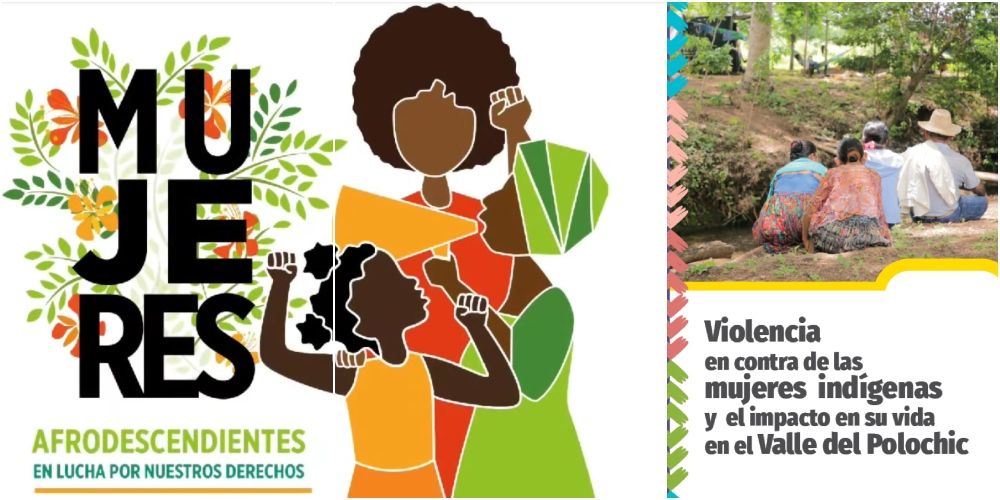
The Feminist School of the European Coordination Via Campesina – ArNA, Arab region of North Africa, was held in Galicia – Spain, from September 27. It was attended by 23 representatives of 15 peasant organizations that are part of our movement in both regions. The host organization was the Sindicato Labrego. The mistica, the anti-patriarchal struggles and the clear commitment to public policies that promote Food Sovereignty, generated a space of understanding and exchange between peasant women, who have deepened their ties of solidarity for urgent situations such as the struggle of the Palestinian people and permanent demands such as land and territory.
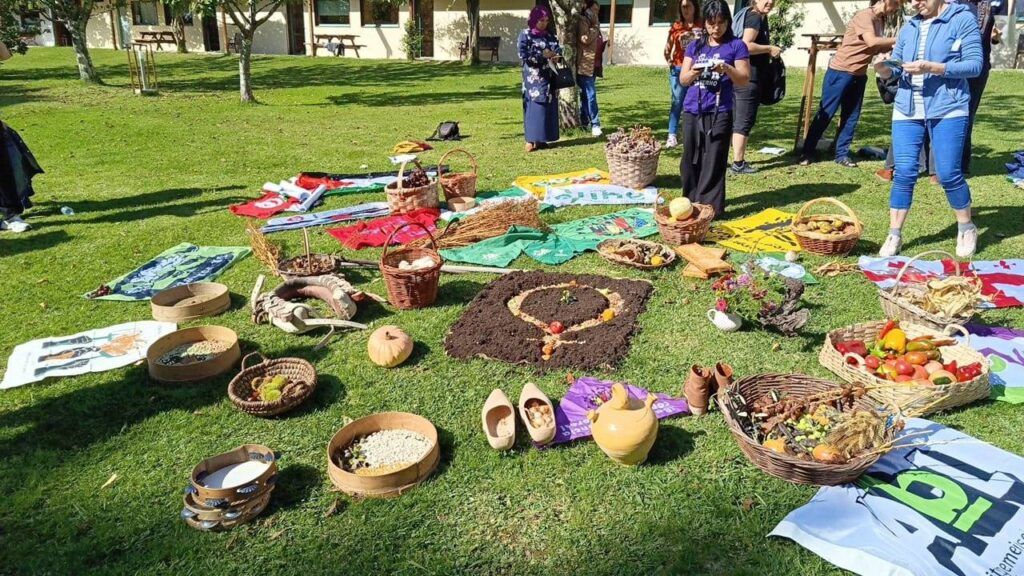
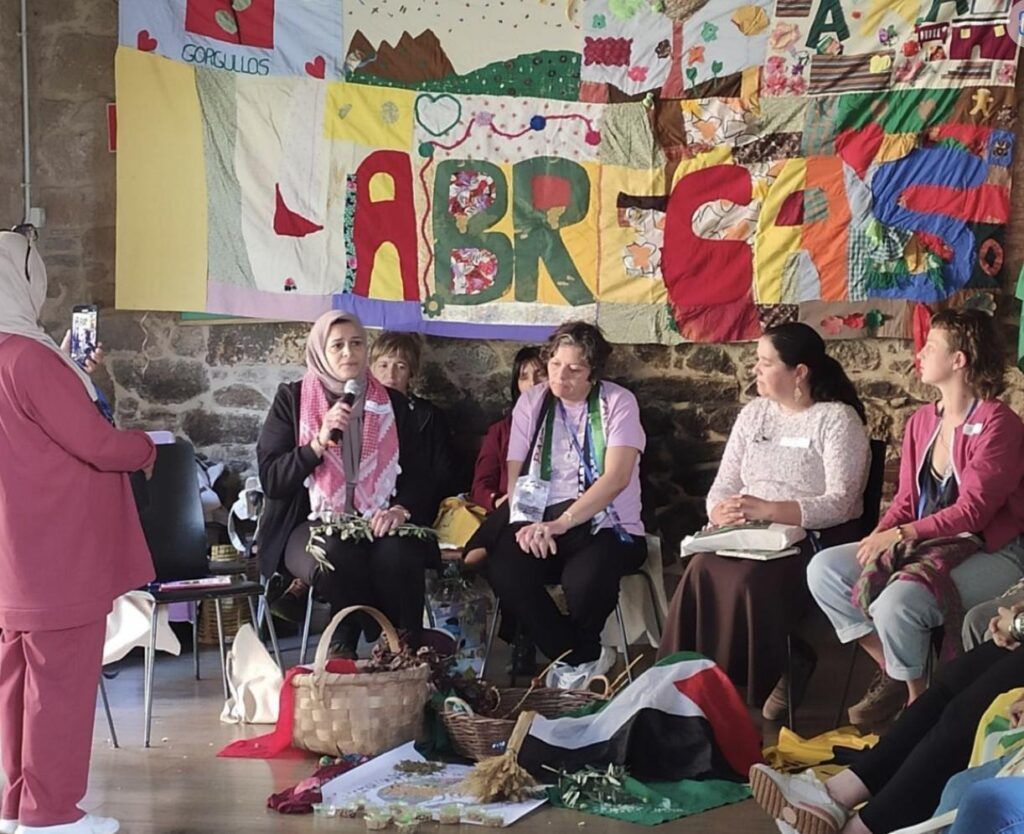
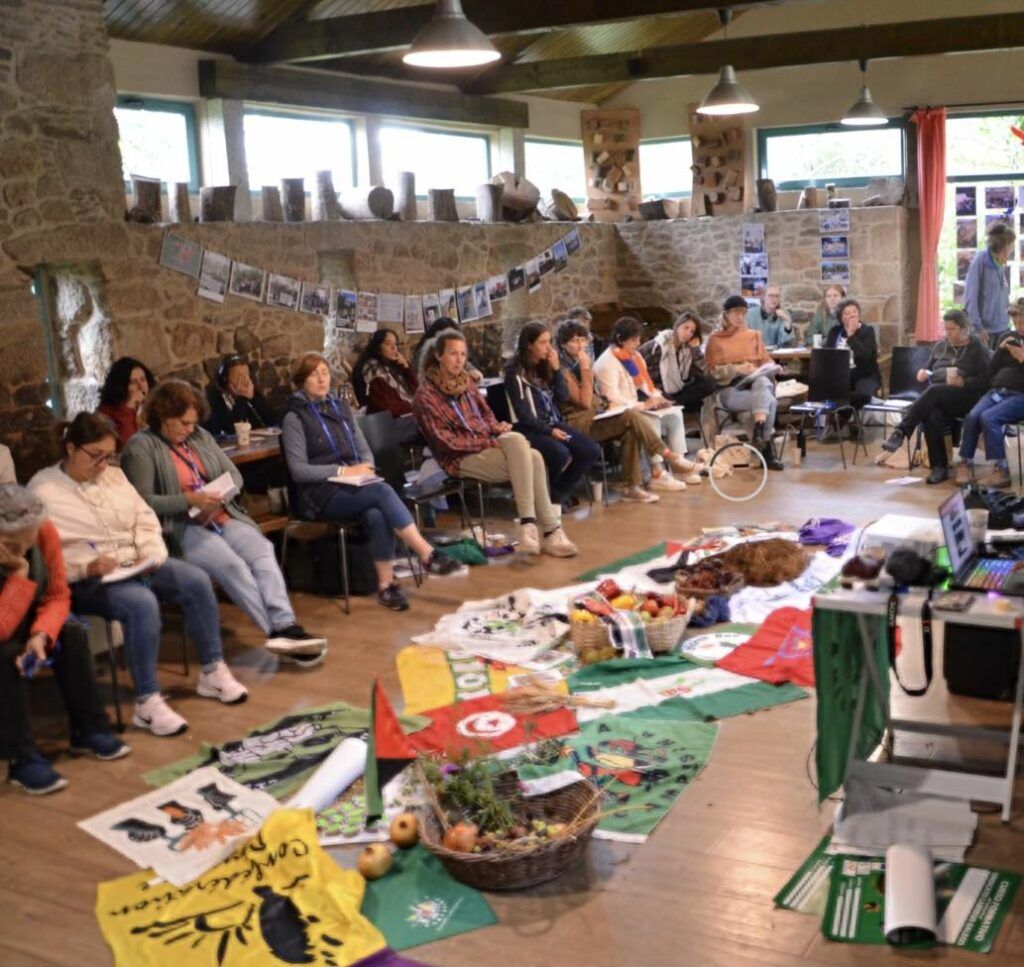
Now, moving onto the Arab Region and North Africa (ARNA) – the members in the region have launched the campaign #StopTheGenocideOfGazaChildren as a solidarity action for Palestine, aiming to draw attention to egregious violations of basic human rights and the total deprivation of an entire population’s rights to land and food sovereignty. While millions of children around the world prepare for a new school year, the children of Gaza stand amidst rubble, destruction, disease, and starvation, stripped of their fundamental rights to education and life. This campaign serves as a crucial reminder of the urgent need for justice and support for Palestinian communities enduring these severe hardships.
In Palestine, the Union of Agricultural Work Committees (UAWC) has launched its annual Olive Harvest Campaign, titled “Sumud and Solidarity.” Running from 15 October to 30 November, this campaign features a series of volunteer days designed to assist small farmers and rural women in accessing their lands and harvesting olives from their orchards. This call is directed at international and solidarity activists who wish to participate in this important initiative as an act of solidarity with peasants.
We wrap up this months edition here. If there are any important updates we have missed, please send the links to communications@viacampesina.org so that we can include them in the next edition. We only include updates from La Via Campesina members. For a comprehensive update on various initiatives from September 2024, please visit our website. Previous editions of our news wrap are also available on our website, and condensed versions are accessible as a podcast on Spotify.
